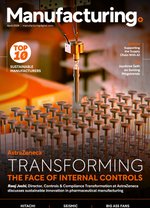The Factory of the Future: Manufacturers' Biggest Challenges

The factory of the future is the next big step for supply chain manufacturing. A step that many experts argue has already been taken, as major manufacturers like Siemens, and ABB invest in factories of the future. Capgemini has an innovative factory of the future approach that takes into account scalability, road mapping and long-term results when implementing digital solutions. The factory of the future uses technology to integrate every aspect of manufacturing operations, for greater efficiency, productivity and data optimisation.
This is done through converging information technology (IT) with operations technology (OT) producing meaningful data that can be used and interpreted to enhance factory and supply chain operations. This results in the implementation of robotics, AI and other technological features that enhance factory efficiency, productivity, sustainability and streamline operations. However, making the move to integrate these technologies comes with notable challenges. Here’s our overview of the biggest ones manufacturers face, and how they can be mediated moving forward.
Data monetisation
Through advanced analytics and applied AI, the factory of the future takes manufacturers' data storage and usage to a whole new level. Data will provide critical user feedback, detect operational hazards and errors and drive formerly manual processes. Data also provides increased customisation, matching growing consumer preferences, allowing manufacturers to identify demand and minimise downtime. Manufacturers must approach data holistically in the factory of the future, using it to effectively monitor full-scale operations in both the past and present, while making informed future predictions.
In predictive contexts, where data can assist with scheduling maintenance, managing periods of increased demand and mitigating risk, manufacturers are given the power to be proactive rather than reactive. Companies must seize on this opportunity, and consult data as a core part of their decision-making.
Supply chain digitisation
The factory of the future extends beyond the factory floor. It is an operational shift that has to be integrated into manufacturers' relationships with suppliers and customers, effectively digitising their supply chain. Before, the supply chain was a sequential and linear process. But now, it’s a complex, multi-layered system with extensive considerations and an increased number of partners. Smart factories and supply chains must come together to achieve effective digital transformation, a process requiring manufacturers to be strategic with technology and fortify their cybersecurity.
“True zero-touch manufacturing goes beyond the four walls of a factory,” said Graham Upton, Head of Technology & Innovation & Chief Architect Intelligent Industry at Capgemini. “Both the product and data need to move uninterrupted all the way through the supply chain, with information in the right format so that it can be handed over flawlessly between sites. This will then allow the full potential of AI to be exploited across the whole lifecycle, which we believe will mitigate a huge number of the challenges facing the sector.”
Tailoring technology to business needs
Digital technologies- or disruptive technologies as they’re often labelled- are not a one-size-fits-all solution. Production processes, approaches and outcomes differ with each manufacturer and technology should complement not compete with this. All technology should be implemented strategically, in ways that uplift and improve the distinct architecture of each manufacturer and further their business goals. This is true also when it comes to choosing what technology to implement. Almost every manufacturer embracing the factory of the future will be investing in IoT, but AI, drones, robotics, 3D painting and advanced analytics are other forms of technology readily available. Manufacturers need to undergo rigorous self-assessment while planning smart factories to establish how best to implement new technology.
The digital skills gap
The challenges and successes that come with advanced technology- from human error to ingenuity- are always dependent on successfully integrating and upskilling people. Technology issues are more often than not about mindsets rather than hardware. As anyone who’s ever discussed politics at the family dinner table knows, changing someone’s established way of thinking is an arduous and pretty impossible task. To embrace new ideas and practices, people need to be welcomed to explore them without judgement and given tangible evidence of their positive impact.
This is especially true in the factory of the future, as the expectations, roles and responsibilities of workers undergo radical evolution. Traditional labour skills will be less valuable with the rise of robots, who can repeat high-risk, repetitive tasks and achieve superior results. The workforce must instead pivot to knowledge-based roles where they creatively manage and interpret the wealth of data provided by smart factories. For this to happen, manufacturers must focus on adaptive change management. They must invest in upskilling their staff, paying attention to areas where they need additional support and encouragement and enhancing safety in terms of both cyber security and on the factory floor.
Compliance with government regulations
Traditional risk and compliance models are going to be changed on a fundamental level by the factory of the future. Manufacturers' policies need to address an increasingly interconnected supply chain ecosystem with considered technology, procedure and GRC policies. Another core aspect of the factory of the future set to change these models is the autonomous and self-adapting nature of its processes. Automation reduces human risk and error, but policies now need to establish how to audit and monitor automation systems. Utilising robotics introduces legal concerns regarding safety, and the enhanced research and development fostered by smart factory operations comes with crucial considerations regarding manufacturers' intellectual property rights. This area is rapidly changing in terms of risk and regulation, so manufacturers need to work to stay updated and informed.
Ultimately, the Factory of the Future is dramatically transforming manufacturing, taking factories to a zero-touch future, according to Graham. “There's no doubt in my mind that the factory of the future is zero-touch,” he said. “Every possible automation technology - robotics, self-configuring machines, automatic remote assistance, process control optimisation - will come together in a touchless world, where processes are not only automated but information flows seamlessly between them, issues are preempted and addressed with minimal intervention.”
******
Make sure you check out the latest edition of Manufacturing Digital and also sign up to our global conference series - Procurement & Supply Chain 2024 & Sustainability LIVE 2024
******
Manufacturing Digital is a BizClik brand.



